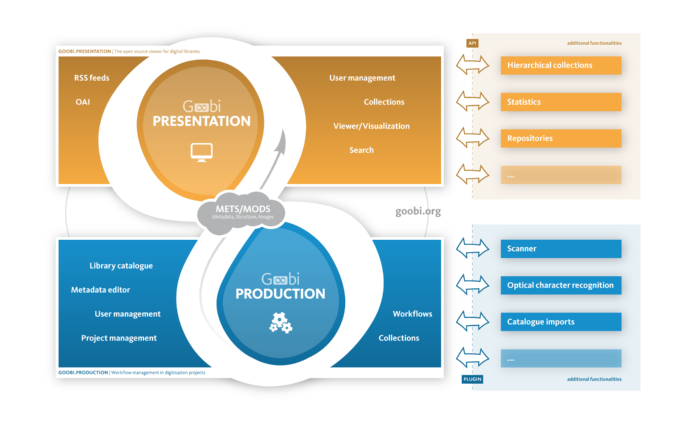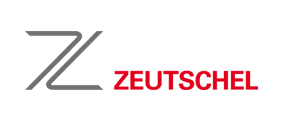Evolution through cooperation
Digitization software Goobi is continually upgraded
The mass digitization sector is becoming ever more dynamic in the library environment. Cultural and scientific institutions are feeling the pressure as suppliers of digital content, due in part to the increasing number of virtual libraries like the Europeana or the German Digital Library (DDB). The Open-source digitization software Goobi, has established itself over the last few years as a central tool in the realisation of digitization projects. An intense commitment from external service providers, plus organizational and functional enhancements, are expected to increase the software's appeal and strengthen its development in the long-term.
The number of Goobi users has risen steadily over the last few years thanks to the modular, web-based structure, the variety of application scenarios, and the low costs compared to commercial solutions.
For example, in Germany there are now around 25 libraries of every size and focus that have successfully realized Goobi projects (see info boxes). Moreover, the concept of cooperative development of powerful digitization tools has also found growing resonance among cultural and scientific institutions in Austria, the Netherlands, France, Great Britain, South Africa, Sweden and Malaysia. According to Dr. Achim Bonte, Deputy Director General of SLUB Dresden and Head of the Goobi Community Board, more than 150 people have now registered for the Goobi Community mailing list.
A working community of developers and users is hugely significant. The four large national libraries in Berlin, Dresden, Göttingen and Hamburg founded the Goobi Community Board in 2009 to bring professional organization to software development. Goobi Release Management provides the required transparency and a stable code basis, as well as dealing with the definition of standards and interfaces. “With this organizational structure we have laid the foundations for the lasting development of Goobi”, emphasizes Achim Bonte.

Customised support
The targeted integration of commercial service providers, such as solutions supplier Zeutschel from Tübingen and systems company Intranda from Göttingen, into the Goobi Open Source Community, was an extremely innovative step. An experiment that has paid off.
Both service providers are involved in the Goobi Community Board and, thus, play a crucial role in the ongoing development of the software solution. Moreover, the majority of Zeutschel und Intranda's programming work benefits the Goobi Community, because software functionality is provided on a open-source basis. “Integrating the two service providers into the Community has had a highly stabilizing effect and has given the Community a stronger backbone”, confirms Bonte.
Further support comes from a comprehensive range of offers, which are divided into services and add-ons. The services range from full system implementation including programming modifications through maintenance and support work to the “carefree” package with reliable provision of digitized content.
In addition, if clients require functionality that is not included or is insufficient in Goobi, they can buy extra components from the service providers. Zeutschel, for example, offers a Z39.50 interface, which can be used to request bibliographic data through Goobi from the various catalog systems. For data presentation Intranda can supply its own viewer and an OCR service for full-text searching.
According to Michael Luetgen, Head of Sales, Software Solutions at Zeutschel, users will benefit in future from additional cooperation with other solution suppliers in the library environment: “For example, content digitized using Goobi will also be compatible with electronic reading rooms like MyBib eL from Imageware. Plus, Zeutschel is orienting its Goobi activities strongly towards Web 3.0, keyword: crowd sourcing”, says Michael Luetgen, explaining his company's ambitious plans.
The service providers' offers and concepts are aimed in particular at the needs of small libraries, ensuring that they too are able to take part in innovative digitization projects. “The reputation Goobi used to have of being an open-source software solution exclusively for large institutions with extensive programming knowledge has been repeatedly and impressively disproved over the last few years”, declares Achim Bonte. As examples he cites the Georg Eckert Institute for International Textbook Research in Braunschweig, the University Library of Bauhaus University in Weimar or the Gottfried Wilhelm Leibniz Library in Hanover, where attractive digitization projects have been realized with the service providers' help.
Shaping the future responsibly
Bonte reports on concrete future plans, which will continue to advance the development of Goobi. He is anticipating a more professional approach to Goobi's organizational structures following the planned founding of an association in September.
Such an association will act as a legal entity, not only as the proprietor of the rights to the name, but also as the operator of the domain goobi.org and copyright owner of the Goobi source code. It would also be able to relieve pressure on the existing entities of the Community Board and Release Management in a variety of ways. Tasks such as member services and public relations, for example, could be taken on by the association office.
From a functional perspective, the plans include integrating a module for text recognition in the routine process. Other major projects deal with adapting Goobi to the workflow requirements of newspaper digitization, which requires programme add-ons at the production and presentation levels, and with the long-term availability of digital objects. “Goobi itself is not a long-term archiving system, but it is compatible with corresponding tools, such as the 'Rosetta' preservation system from Ex Libris Group, for example”, explains Achim Bonte.
Overall, he believes Goobi is extremely well prepared for the future: “Libraries and other cultural institutions need lasting digitzation solutions that are sustainable and financially feasible. To survive in light of the unparalleled dynamic of the change processes in the digital information market, we must expand our in-house decision-making and development expertise as planned, and break into the traditionally closed circle of commercial software suppliers. An international community of developers based on open-source software is clearly an advantage here and also offers users support if commercial software solutions are no longer being developed by their manufacturers”.
About Goobi
“Goobi” is a software solution for the production and presentation of digitized material. The software suite is an open-source and licence-free tool, which is made available free of charge to interested users in the form of an open-source edition. This basic version can be expanded by purchasing optional add-on modules and services from the two service providers Zeutschel and Intranda. Goobi's structure follows a modular principle. The individual elements can run independently and communicate with one another via defined interfaces.
http://www.goobi.org/
Statement: Robert Strötgen
Head of Information Management and Publication
Georg Eckert Institute for International Textbook Research, Braunschweig
Goobi application: As part of the GEI-Digital Project approximately 2,000 history textbooks from the German imperial period, totalling around 350,000 pages, had been digitized by July 2012.
“A cost comparison between Goobi and a commercial digitization solution prior to the project revealed clear cost advantages in using the open-source solution. With the investment that we would have had to make just to start the project with commercial digitization software, we were able to run Goobi – including the necessary costs for modifications – over several project stages. We haven't spent a single second regretting our choice of Goobi.”
Statement: Benjamin Mödinger
IT Department (Technical Infrastructure, Goobi)
Württemberg State Library, Stuttgart
Goobi application: The current digitization strategy of the Württemberg State Library includes manuscripts, incunables, VD16 prints, graphic art, cityscapes and music. Some 100,000 digitised items have been processed to date using Goobi, including Hölderlin manuscripts and works significant for the 60th anniversary of the state of Baden-Württemberg.
“The crucial factors in the decision in favour of Goobi were the excellent integration in the library's own infrastructure and web presence, as well as the lack of ongoing – scaled to volume – licensing costs. In addition, Goobi's set-up means that digitized content can be accessed, managed and presented in the long-term without proprietary lock-ins. The workflow concept is extremely intuitive and the workflow can easily be adapted to our own needs.”
Statement: Dr Frank Simon-Ritz
Director of the University Library of Bauhaus University Weimar
http://www.uni-weimar.de/digitalesammlungen
Goobi application: The University Library of Bauhaus University Weimar is home to large volumes of the book collections of this institution and its predecessors, the various schools of art and construction of Weimar. Thanks to high-quality indexing and digitization, this collection has been made available for increasingly international research through open access. Altogether, around 1,500 volumes with a total of approx. 430,000 pages have been digitized.
“Because it is browser-based, Goobi allows transparent working regardless of location and is also used as workflow software to control workflows in the project. A new version of the online user interface with some significant innovations was implemented in January 2012 in cooperation with the Goobi service provider Intranda. We were particularly impressed with the integration of OCR functionality, which has been set up in our application both for Antiqua and Fraktur scripts.”
Statement: Dr Reinhard Laube
Head of the Department of Manuscripts and Old Prints
Gottfried Wilhelm Leibniz Library,
Lower Saxony State Library, Hanover
Goobi application: The Gottfried Wilhelm Leibniz Library has digitized manuscripts and prints from the Library of the Royal Gardens of Herrenhausen. A new project has now started, which is digitizing volumes from the working library of Gottfried Wilhelm Leibniz. There are currently around 20,000 digitized items.
“Our choice of an open-source concept is a choice of a community that believes in continual development of the software, which means it reflects the latest thinking in the field. Cooperation with the Goobi service provider Zeutschel enabled us to implement Goobi with very little work for our own personnel. The complete service from Zeutschel includes updates of new Goobi versions and support in relation to collection-specific requirements. The service concept offers us high flexibility.”
